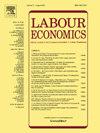Work meaning and fair wages
IF 2.6
2区 经济学
Q2 ECONOMICS
引用次数: 0
Abstract
Work meaning can be an important driver of labor supply. Since, by definition, work meaning is associated with benefits for others, it also has an important fairness dimension. In a theoretical model, we show that workers’ willingness to pay for work meaning can be positive or negative, depending on the relative strength of fairness concerns and meaning preferences. To examine the importance of these behavioral motives for labor supply, we conduct a survey experiment with representative samples from The Netherlands and Germany in which we vary within-subject the benefits that a job creates for others. We find that only a minority of workers are actually willing to sacrifice wage for work meaning. The average willingness to pay for work meaning is positive, but substantially lower than the willingness to pay for job flexibility. There is a strong negative relationship between fairness concerns and willingness to pay for work meaning. Thus, individuals who prioritize fairness are less likely to accept lower wages for meaningful work.
工作的意义和公平的工资
工作意义是劳动力供给的重要驱动因素。因为,根据定义,工作意义与他人的利益有关,它也有一个重要的公平维度。在理论模型中,我们表明,工人为工作意义付费的意愿可以是积极的,也可以是消极的,这取决于公平关注和意义偏好的相对强度。为了检验这些行为动机对劳动力供给的重要性,我们对来自荷兰和德国的代表性样本进行了一项调查实验,在实验中,我们对一份工作给其他人带来的好处进行了不同的研究。我们发现,只有少数工人真正愿意为了工作的意义而牺牲工资。为工作意义付费的平均意愿是积极的,但远远低于为工作灵活性付费的意愿。对公平的关注与为工作意义付费的意愿之间存在强烈的负相关关系。因此,优先考虑公平的人不太可能接受有意义的工作的低工资。
本文章由计算机程序翻译,如有差异,请以英文原文为准。
求助全文
约1分钟内获得全文
求助全文
来源期刊

Labour Economics
ECONOMICS-
CiteScore
3.60
自引率
8.30%
发文量
142
期刊介绍:
Labour Economics is devoted to publishing research in the field of labour economics both on the microeconomic and on the macroeconomic level, in a balanced mix of theory, empirical testing and policy applications. It gives due recognition to analysis and explanation of institutional arrangements of national labour markets and the impact of these institutions on labour market outcomes.
 求助内容:
求助内容: 应助结果提醒方式:
应助结果提醒方式:


